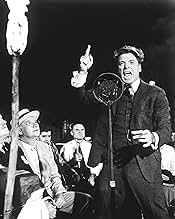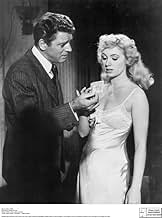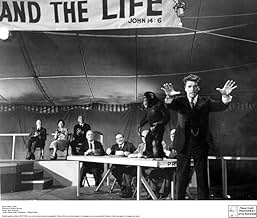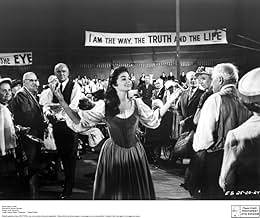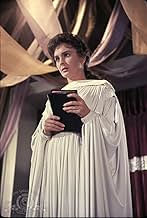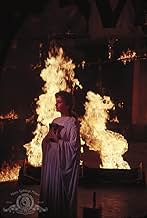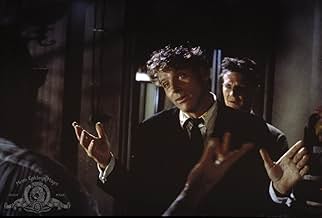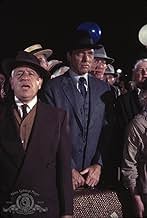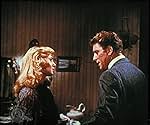ÉVALUATION IMDb
7,7/10
13 k
MA NOTE
Un vendeur bavard et charmant arrive à convaincre une évangéliste sincère qu'il pourrait être un prédicateur efficace pour sa cause.Un vendeur bavard et charmant arrive à convaincre une évangéliste sincère qu'il pourrait être un prédicateur efficace pour sa cause.Un vendeur bavard et charmant arrive à convaincre une évangéliste sincère qu'il pourrait être un prédicateur efficace pour sa cause.
- A remporté 3 oscars
- 11 victoires et 14 nominations au total
Edward Andrews
- George F. Babbitt
- (as Ed Andrews)
Harry Antrim
- Salesman in Saloon
- (uncredited)
Larry J. Blake
- Mac - Bartender
- (uncredited)
Phil Bloom
- Cornerman
- (uncredited)
Paul Bradley
- Congregation Member
- (uncredited)
Histoire
Le saviez-vous
- AnecdotesWhen he first learned that Richard Brooks was interested in adapting his novel, Sinclair Lewis told him that he should change it significantly, advising him to read all the criticisms of the book and use them as a way to improve on it.
- GaffesThe location where Sister Sharon confronts the police captain and fire chief over erecting her tent is purported to be in Lincoln Nebraska. The opening part of the scene shows mountains in the background. There are no mountains around Lincoln.
- Citations
Lulu Bains: Oh, he gave me special instructions back of the pulpit Christmas Eve. He got to howlin' "Repent! Repent!" and I got to moanin' "Save me! Save me!" and the first thing I know he rammed the fear of God into me so fast I never heard my old man's footsteps!
- Générique farfeluScrolled before the opening credits: "We believe that certain aspects of Revivalism can bear examination- that the conduct of some revivalists makes a mockery of the traditional beliefs and practices of organized Christianity! We believe that everyone has a right to worship according to his conscience, but- Freedom of Religion is not license to abuse the faith of the people! However, due to the highly controversial nature of this film, we strongly urge you to prevent impressionable children from seeing it!"
- ConnexionsFeatured in Hollywood: The Fabulous Era (1962)
- Bandes originalesI'm On My Way to Canaan Land
(uncredited)
Traditional
Arranged by Mahalia Jackson
Sung by Patti Page and the audience at a revival meeting
Reprised by her at the end
Commentaire en vedette
I just spend two days at my best friends' home for his father's funerals, and during the obligatory moments of life contemplation, we were wondering what was awaiting us all. I guess it's hard to imagine that your beloved one has faded into nothingness, so religion brings you a certain psychological comfort in knowing that there's such a thing as a soul and that, depending on a man's life, it gets the treatment it deserves. Yes, sir-ree, it might feel simplistic but at least it's fair and square.
I think this logic might explain why revivalism is so fervent in America, most of the small-town folks wouldn't fancy an alternative to an after-world where the good isn't rewarded and the evil punished, God fabricated men in its own image so it's only fair that men built a society that works in the same way than God, even if God can act in mysterious ways... let's face it, even the most sophisticated ones of us wouldn't figure out a universe where religion, as complex as it is, wouldn't be easy to "pitch", no matter how tempting agnosticism could be.
This is why promoting revivalism in the hearts of Americans isn't the most difficult thing to operate, it all comes down to telling people that they're going to burn in hell if they sin and to save their souls if they repent, people are ready to hear that if the words come from the right mouths, it's like a good cop/bad cop routine. In Richard Brooks' "Elmer Gantry", adapted from the novel of the same name by Sinclair Lewis, the good cop is Jean Simmons as Sister Sharon Falconer, a saintly revivalist who talks in sweet and delicate prose, and handles her followers and her endeavor like a businessman would do, and there's the bad cop, but one hell of a smooth-talker named Elmer Gantry.
In the original novel, he was an ordained Minister, in the film, in order to appease the Hays Code, he's an ex-Bible salesman who learned the voices of Gospel from scratch and is capable to infuse Bible passages in every monologue, with a grin that would convince the devil himself to sing Halleluiah. To call Gantry charismatic is an understatement, the casting of Burt Lancaster is perfect if only for providing him that irresistible smile, one so charming that it can get away with the scariest threats or allow an improvised line about love to become his catchphrase and play like a running gag all through the film.
What works even better in Lancaster's performance is that his intents are rarely clear and a big cloud of mystery floats around his solid shoulders. His character-establishing moment occurs when he convinces a bunch of drunkards to give charity money to old Christian ladies during a Xmas celebration. With his smile, he manages to skim money off a few piles without even asking, working like the gangster who'd get anything with a smile rather than a threat. Before, he was telling naughty jokes and after, he would have sex with Lulu Baines (Shirley Jones), a hooker who couldn't resist his words, a move that would backfire at him later. Gantry is irresistible indeed, but he's a swindler and I'd say about him what I say about Fellini's "Bidone", before you find them sympathetic, keep in mind it's part of their job.
So Gantry drifts from a place to another until he meets Sister Shara and has an epiphany. He cons her into believing he can attract the crowds with a "saved salesman" speech, Gantry brings crowds indeed and makes arrangements with Zenith church leaders, convincing her that religion must be a spectacle and must bring money in order to survive, and then we get to a second act where it's all about the spectacular improvisation of Lancaster and the professional talent of Simmons, religion turns out to be a big circus, where even the enthusiasm of the audience is part of the show. Lancaster and Jones won the Oscar but Jean Simmons was sure robbed of a nomination and even Arthur Kennedy as the no-nonense big-city reporter Lefferts had a few interesting sequences as the man of reason in the midst of that huge cacophony.
Yes, because there's a lot of noise in the film and this is why it never ceases to be entertaining, so many speeches like a "Network" of the 60s, the noise of religious frenzy, of media craving for sensationalism, of cheering and booing, of "Glory Glory Halleluiah", the film was directed the same year than "Inherit the Wind" but the handling of religion and religious figures is in such a hyperbolic way we might suffer from dizziness, especially when romantic feelings get mixed up and the film culminates with a third act where the ugliness implodes on everyone, what goes around...
This all leads to the inevitable confrontation between good ol' truth and ol' time religion... but the film (like "Inherit the Wind") tries to give the two sides a fair trial, even avoiding to make a total scam out of Gantry and keep him sympathetic even when he's truly guilty of manipulation. But isn't it all about manipulation after all? Media, businessmen, corporations, public opinion, religion, are all institutions guided by noble intentions but that couldn't keep on going without money. Some things exist because they have to... and because they need to exist must count on the shadiest ambassadors, ironically, Gantry was the most human of all, especially with his weakness for a good drink.
The film explores all the facets and allows each side to be given a fair treatment but it also shines by its punchy script, gutsy approach and an unforgettable performance by Burt Lancaster aka "The Grin", a hard-drinking fellow who embodied an aspect of religion that can echo Homer's statement about alcohol as the cause and the solution to all men's problem. Cheers!
I think this logic might explain why revivalism is so fervent in America, most of the small-town folks wouldn't fancy an alternative to an after-world where the good isn't rewarded and the evil punished, God fabricated men in its own image so it's only fair that men built a society that works in the same way than God, even if God can act in mysterious ways... let's face it, even the most sophisticated ones of us wouldn't figure out a universe where religion, as complex as it is, wouldn't be easy to "pitch", no matter how tempting agnosticism could be.
This is why promoting revivalism in the hearts of Americans isn't the most difficult thing to operate, it all comes down to telling people that they're going to burn in hell if they sin and to save their souls if they repent, people are ready to hear that if the words come from the right mouths, it's like a good cop/bad cop routine. In Richard Brooks' "Elmer Gantry", adapted from the novel of the same name by Sinclair Lewis, the good cop is Jean Simmons as Sister Sharon Falconer, a saintly revivalist who talks in sweet and delicate prose, and handles her followers and her endeavor like a businessman would do, and there's the bad cop, but one hell of a smooth-talker named Elmer Gantry.
In the original novel, he was an ordained Minister, in the film, in order to appease the Hays Code, he's an ex-Bible salesman who learned the voices of Gospel from scratch and is capable to infuse Bible passages in every monologue, with a grin that would convince the devil himself to sing Halleluiah. To call Gantry charismatic is an understatement, the casting of Burt Lancaster is perfect if only for providing him that irresistible smile, one so charming that it can get away with the scariest threats or allow an improvised line about love to become his catchphrase and play like a running gag all through the film.
What works even better in Lancaster's performance is that his intents are rarely clear and a big cloud of mystery floats around his solid shoulders. His character-establishing moment occurs when he convinces a bunch of drunkards to give charity money to old Christian ladies during a Xmas celebration. With his smile, he manages to skim money off a few piles without even asking, working like the gangster who'd get anything with a smile rather than a threat. Before, he was telling naughty jokes and after, he would have sex with Lulu Baines (Shirley Jones), a hooker who couldn't resist his words, a move that would backfire at him later. Gantry is irresistible indeed, but he's a swindler and I'd say about him what I say about Fellini's "Bidone", before you find them sympathetic, keep in mind it's part of their job.
So Gantry drifts from a place to another until he meets Sister Shara and has an epiphany. He cons her into believing he can attract the crowds with a "saved salesman" speech, Gantry brings crowds indeed and makes arrangements with Zenith church leaders, convincing her that religion must be a spectacle and must bring money in order to survive, and then we get to a second act where it's all about the spectacular improvisation of Lancaster and the professional talent of Simmons, religion turns out to be a big circus, where even the enthusiasm of the audience is part of the show. Lancaster and Jones won the Oscar but Jean Simmons was sure robbed of a nomination and even Arthur Kennedy as the no-nonense big-city reporter Lefferts had a few interesting sequences as the man of reason in the midst of that huge cacophony.
Yes, because there's a lot of noise in the film and this is why it never ceases to be entertaining, so many speeches like a "Network" of the 60s, the noise of religious frenzy, of media craving for sensationalism, of cheering and booing, of "Glory Glory Halleluiah", the film was directed the same year than "Inherit the Wind" but the handling of religion and religious figures is in such a hyperbolic way we might suffer from dizziness, especially when romantic feelings get mixed up and the film culminates with a third act where the ugliness implodes on everyone, what goes around...
This all leads to the inevitable confrontation between good ol' truth and ol' time religion... but the film (like "Inherit the Wind") tries to give the two sides a fair trial, even avoiding to make a total scam out of Gantry and keep him sympathetic even when he's truly guilty of manipulation. But isn't it all about manipulation after all? Media, businessmen, corporations, public opinion, religion, are all institutions guided by noble intentions but that couldn't keep on going without money. Some things exist because they have to... and because they need to exist must count on the shadiest ambassadors, ironically, Gantry was the most human of all, especially with his weakness for a good drink.
The film explores all the facets and allows each side to be given a fair treatment but it also shines by its punchy script, gutsy approach and an unforgettable performance by Burt Lancaster aka "The Grin", a hard-drinking fellow who embodied an aspect of religion that can echo Homer's statement about alcohol as the cause and the solution to all men's problem. Cheers!
- ElMaruecan82
- 9 juill. 2019
- Lien permanent
Meilleurs choix
Connectez-vous pour évaluer et surveiller les recommandations personnalisées
- How long is Elmer Gantry?Propulsé par Alexa
Détails
- Date de sortie
- Pays d’origine
- Langue
- Aussi connu sous le nom de
- Elmer Gantry
- Lieux de tournage
- société de production
- Consultez plus de crédits d'entreprise sur IMDbPro
Box-office
- Budget
- 3 000 000 $ US (estimation)
- Brut – à l'échelle mondiale
- 64 $ US
- Durée2 heures 26 minutes
- Rapport de forme
- 1.66 : 1
Contribuer à cette page
Suggérer une modification ou ajouter du contenu manquant

Lacune principale
By what name was Elmer Gantry le charlatan (1960) officially released in India in English?
Répondre

